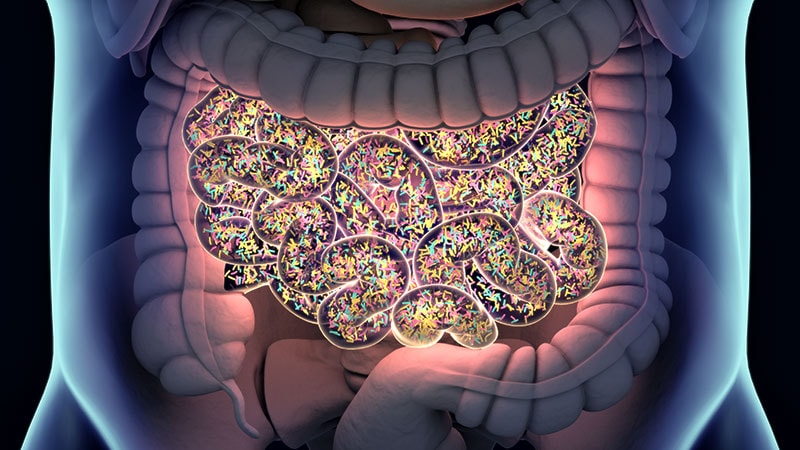Distinct Small Bowel Microbiome Profiles Observed in Overweight and Obese Individuals
Core Concepts
The microbial composition of the small bowel is significantly altered in adults with overweight or obesity, suggesting potential therapeutic targets.
Abstract
This study examined the small bowel microbiome in individuals with different weight categories. Duodenal aspirates and serum samples were collected from 214 adults (105 normal weight, 67 overweight, 42 obese) undergoing routine endoscopy.
Key findings:
Overweight-specific features: Lower abundance of Bifidobacterium and Escherichia coli K-12, higher abundance of Lactobacillus intestinalis, L. johnsonii, and Prevotella loescheii.
Obesity-specific features: Higher L. gasseri, lower Limosilactobacillus reuteri, Alloprevotella rava, and Leptotrichia spp.
"Escalation" features (normal to overweight to obesity): Decreasing Bacteroides pyogenes, Staphylococcus hominis, unknown Faecalibacterium; increasing unknown Lactobacillus and Mycobacterium; decreasing potential for biogenic amine metabolism.
"De-escalation" features (normal to overweight to obesity): Changes in L. acidophilus, L. hominis, L. iners, and Bifidobacterium dentium.
Specific Lactobacillus species linked to dyslipidemia and overweight, A. rava linked to certain dyslipidemia types.
The authors conclude that direct analysis of the small bowel microbiome has revealed specific microbial targets for further study as potential therapeutic options for overweight and obesity.
Small Bowel Microbiome Profiles Differ in Overweight/Obesity
Stats
The study included 214 adults: 105 with normal weight, 67 with overweight, and 42 with obesity.
Duodenal aspirates and serum samples were obtained from all participants.
Quotes
"We identify small bowel microbial species associated with overweight and obesity, as well as escalation and de-escalation features that could potentially be selected as therapeutic targets."
"These findings illustrate that, although stool studies can and have provided very valuable data, direct analysis of the small bowel has yielded specific targets for further study."
Key Insights Distilled From
by Megan Brooks at www.medscape.com 05-03-2024
https://www.medscape.com/viewarticle/small-bowel-microbiome-profiles-differ-overweight-obesity-vs-2024a10008kr
Deeper Inquiries
How might the identified small bowel microbial changes contribute to the development or progression of overweight and obesity?
The identified small bowel microbial changes, such as the lower abundance of Bifidobacterium species and Escherichia coli strain K-12 in overweight individuals, and the higher abundance of certain Lactobacillus and Prevotella species in obesity, can play a significant role in the development and progression of overweight and obesity. These alterations in the small bowel microbiome can impact nutrient absorption, energy metabolism, and inflammation, all of which are key factors in the pathophysiology of obesity. For example, certain Lactobacillus species have been linked to dyslipidemias, which are common in individuals with obesity. Additionally, changes in microbial populations can affect the production of metabolites that influence appetite regulation and fat storage, further contributing to weight gain and obesity.
What are the potential limitations of relying solely on stool samples to characterize the gut microbiome in obesity-related research?
Relying solely on stool samples to characterize the gut microbiome in obesity-related research has several limitations. Stool samples provide information mainly about the distal gut microbiota, while the small bowel microbiome, as highlighted in the study, plays a crucial role in metabolic processes and inflammation related to obesity. Therefore, stool samples may not capture the specific microbial changes occurring in the small bowel, which are directly linked to overweight and obesity. Additionally, stool samples may not reflect real-time changes in the gut microbiome, as microbial composition can vary along the gastrointestinal tract. Furthermore, factors such as transit time, diet, and medications can influence the composition of stool microbiota, potentially confounding the results of studies focusing solely on stool samples.
Could targeted modulation of the small bowel microbiome, such as through dietary interventions or probiotics, be a viable therapeutic approach for managing overweight and obesity?
Targeted modulation of the small bowel microbiome through dietary interventions or probiotics holds promise as a viable therapeutic approach for managing overweight and obesity. The identified microbial changes associated with overweight and obesity, including specific Lactobacillus and Bifidobacterium species, present potential targets for intervention. By promoting the growth of beneficial bacteria or inhibiting the overgrowth of harmful species, dietary modifications or probiotic supplementation could help restore microbial balance in the small bowel. This, in turn, may positively impact metabolic processes, inflammation, and other factors contributing to weight gain and obesity. However, further research is needed to elucidate the specific mechanisms by which small bowel microbiome modulation can influence weight management and to determine the most effective dietary or probiotic interventions for individuals with overweight or obesity.
0
